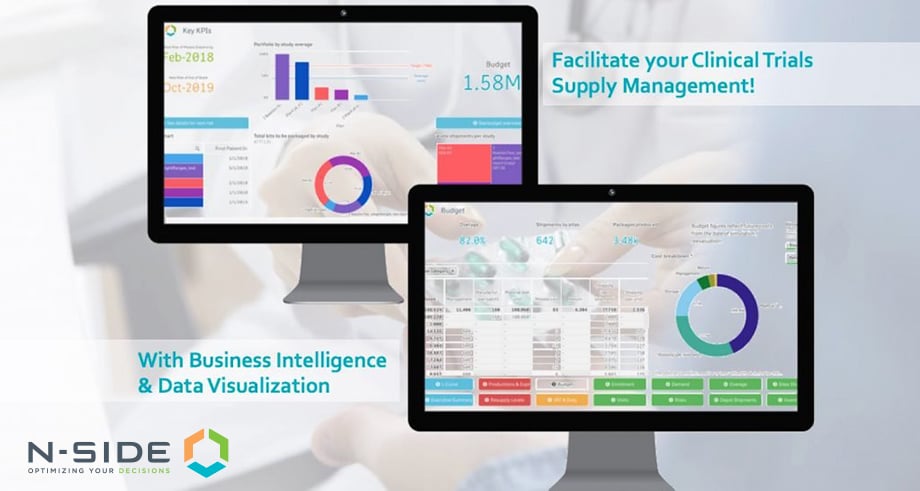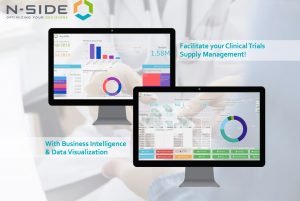How to optimize your clinical trial supply chain management using advanced analytics?


 Sylvia Haller
Sylvia Haller
Achieving an agile and optimal clinical trial supply strategy is challenging – clinical trial supply managers must forecast for unpredictable demand while at the same time ensure that there is no risk to patients receiving their medication on time. Due to this inherent uncertainty and very high service level requirement, a number of advanced analytics techniques naturally lend themselves to the task.
Cutting-edge technologies applied to clinical trial supply management can provide robust forecasts, identify opportunities for reducing drug waste while at the same time effectively manage risk. Monte Carlo simulations, optimization techniques, machine learning and business intelligence dashboards all play a role in reliable and robust clinical trial supply forecasting and management.
How do the different advanced analytics techniques contribute to improving your clinical trial supply planning?
Monte-Carlo simulations for risk assessment
Monte-Carlo simulations mimic everyday life uncertainty and therefore provide risk assessment for the clinical trial. The unpredictability of the trial’s evolution is captured by simulating the trial thousands of times, allowing each point of uncertainty in the trial to occur in different ways according to statistical probability.
For example, with Monte Carlo simulation results, the results provide not only forecasts of the average kit demand, but also the maximum and minimum kit demand over time that can be expected. With simulation, where and when risk can occur is pinpointed. The level of planned overage, or extra kits above the patient demand needed to cover the operational risk, is given as an output.
In order to benefit the most from Monte Carlo simulations, it is important to use a state of the art solution with the most efficient algorithms. With such advanced tools, high numbers of simulations can be run efficiently to provide reliable risk assessment .
Optimization for optimal trial supply strategy
Simulations are a good start, but alone do not answer which is the best strategy for a trial. Optimization techniques go further and are used to optimize decisions about the clinical supply strategy, such as IRT settings, packaging plan, depot resupply strategy, overage per kit type for the trial.
Artificial intelligence and Machine Learning for agile trial planning management
It’s almost certain that as the trial evolves, changes from the initial assumptions will occur. This is where artificial intelligence plays a part. Learning from actual trial data is essential to update the strategy. Predictive analytics provide reliable forecasts based on a smart balance of both clinical assumptions and real-life study data thanks to machine learning techniques. This allows CTS managers to efficiently and safely navigate the change in their trials.
Business intelligence to visualize and interact with trial data
 Business intelligence dashboards allow dynamic interaction with the global, structured database including both application’s inputs and outputs. These dashboards provide various predictive reporting capabilities at trial, program or portfolio level. Any clinical parameter (e.g. patient recruitment rates) that would deviate from initial assumptions will be highlighted by the real-time monitoring dashboards in order to support supply chain managers in their tricky follow-up of ongoing trials.
Business intelligence dashboards allow dynamic interaction with the global, structured database including both application’s inputs and outputs. These dashboards provide various predictive reporting capabilities at trial, program or portfolio level. Any clinical parameter (e.g. patient recruitment rates) that would deviate from initial assumptions will be highlighted by the real-time monitoring dashboards in order to support supply chain managers in their tricky follow-up of ongoing trials.
Furthermore, specific comparative reports and interactive dashboards allow efficient analysis of the impact of any change in the protocol design, supply network or other assumptions.
Advanced Analytics for robust & reliable clinical trial management
While each of these types of advanced analytics contribute to building robust, reliable clinical trial planning and management, it is best when they are smartly combined to apply in a consistent, global way. Also important is having best in class algorithms for quick processing times to ensure that thousands of simulation runs can be achieved within a couple of minutes. Finally ease of use is an important criteria – user friendliness of the solution and results has an impact of how likely a clinical trial supply manager will for example use a management dashboard for decision making or use an output report. Flexibility in being able to model accurately your trial.
Interested to know more about Advanced Analytics for clinical trial management optimization?
As Advanced Analytics experts, N-SIDE smartly combines each of these advanced analytics technologies to provide robust and reliable results to optimize you clinical trial supply forecasts.
Compared to other standard forecasting systems, the N-SIDE solutions optimises your clinical supplies based on a reliable risk assessment. N-SIDE tests a very large number of supply strategies and assesses the cost and risk associated with each. Thus, the user is able to implement the supply strategy having the optimal cost vs risk trade-off. By doing so, N-SIDE also automatically optimises the overage/waste level (this requested overage is therefore an output, whereas it is an input for all other forecasting systems) required to safely manage your trial at the lowest possible cost. Machine learning techniques ensure that strategies are optimally adjusted as the trial evolves. N-SIDE solutions will also guarantee that the optimised supply strategy will balance distribution and material costs in the most efficient way.
Ready to optimize your clinical trial supply chain mangement?



